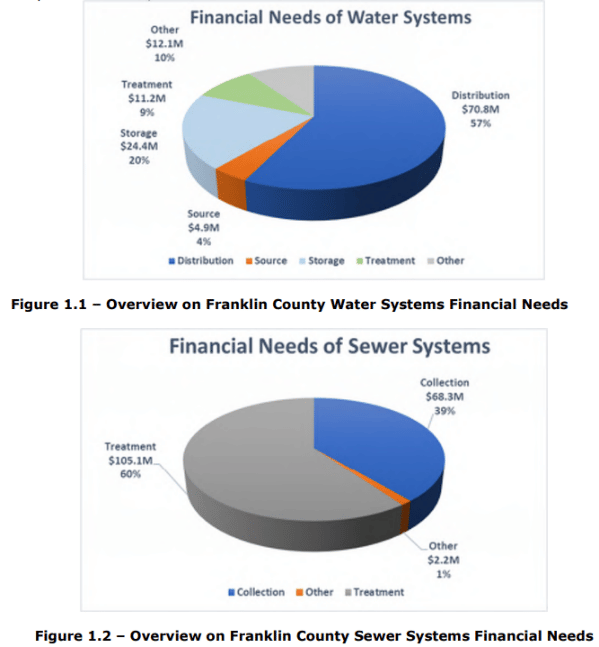Many rural communities across the country have long faced demographic challenges as the changing economy has continued to push residents towards jobs in urban and suburban centers. The remote work revolution and the reconsideration of living in rural areas ushered in by the COVID-19 pandemic has been seen by many rural leaders as a once-in-a-lifetime opportunity to attract workers and their families, potentially reversing population declines and spreading growth and opportunity. Attracting that growth, however, requires communities to invest in high-quality modern infrastructure that often is challenging for rural systems with limited resources and capacity to fund, apply for, or manage.

The Franklin County Water and Wastewater Systems Study includes GIS mapping, an analysis of short- and long-term investment priorities for each system, and a description of shared issues at the regional scale.
FRCOG and the Franklin County Water and Wastewater Study
In Northwest Massachusetts, the Franklin Regional Council of Governments (FRCOG) is capitalizing on its regional perspective and resources to better serve its small towns by offering to assist individual systems and/or coordinate shared water and wastewater infrastructure initiatives. Its recently released Franklin County Water and Wastewater Systems Study is a key part of that strategy. Before undertaking the study, FRCOG had a limited understanding of the scope of issues affecting the eighteen public water and fifteen public wastewater systems in its service area. FRCOG, a membership organization of the region’s 26 municipal governments, had been involved with infrastructure work in the past, especially on transportation and broadband issues, but had not traditionally worked in the water utility space.
The study found that many of the systems in the area faced similar issues, providing an opportunity for working together on projects at the regional scale. Due to their size—many have just one or two operators on staff—some systems were facing issues with lost institutional knowledge from retirements or lack of access to modern GIS mapping and other technologies. Most operators serve fewer than 10,000 customers, making them amongst the 97% of water utilities in the United States classified as Small Water Systems. Additionally, five village centers in the county had expressed interest in developing water or wastewater infrastructure in the past, but further planning was needed.
Convening Partners and Leveraging Funding
Though these issues had been known for many years, the major catalyst for the joint planning effort was Franklin County’s recognition of impacts due to climate change. Tropical Storm Irene in 2011 caused unprecedented widespread flooding, overwhelming wastewater systems and causing concerns that the county was vulnerable to larger, more extreme weather events in the future. At the same time, greater regulatory demands and aging infrastructure increased pressure on these systems. In 2019, State Senator Jo Comerford, State Representative Natalie Blais, and FRCOG held a large regional forum to bring together system operators, municipal leaders, staff from federal agencies, and political representatives to discuss shared issues and opportunities. Follow-up meetings after the forum clarified the need for a regional study. As a U.S. Economic Development Administration (EDA)-designated Economic Development District, FRCOG received a $400,000 CARES Act planning grant, of which $100,000 of these funds were used to launch the water and wastewater study.

The study identified nearly $300 million in investment needs and acts as a snapshot of each operator’s current capacity.
Identifying Investment Needs and Preparing for the Future
The study, conducted in partnership with the consulting firm Tighe & Bond, Inc. and released in June 2022, includes GIS mapping, an analysis of short- and long-term investment priorities for each system, and a description of shared issues at the regional scale. Many of the themes it uncovered—such as the growing cost of sludge disposal—will serve as the basis for future grant applications and infrastructure investments. Nearly $300 million in investment needs were detailed in the study. Moreover, it acts as a snapshot of each operator’s current capacity as well as the status of work to bring water and wastewater infrastructure to the five village centers that had studied it in the past. “This snapshot of system needs, at the district and regional level, is something we have always wanted. It gives us information so we are better positioned to help our communities plan for their future and address current needs,” says Jessica Atwood, FRCOG Economic Development Program Manager.
Beyond the immediate benefit of clarifying the status of each system’s needs, the planning process highlighted the potential strength of a regional approach to shared infrastructure challenges. Going forward, FRCOG intends to continue to play a role by offering to facilitate shared procurement and assisting systems with grant writing or other needs. It is anticipated that improved water and wastewater system performance and technology will make the region more competitive to support new housing and business development as well as increase quality of life for current and future residents.
To learn more about regional development organizations (RDOs) like the Franklin Regional Council of Governments and how they can support your own local planning and infrastructure efforts, visit www.nado.org. If your community is not yet connected with your RDO or you are unsure which RDO serves where you live, please reach out to NADO Research Foundation Associate Director Brett Schwartz at bschwartz@nado.org.
Special thanks to Jessica Atwood, FRCOG Economic Development Program Manager, for providing insight and background information in support of this case study.

